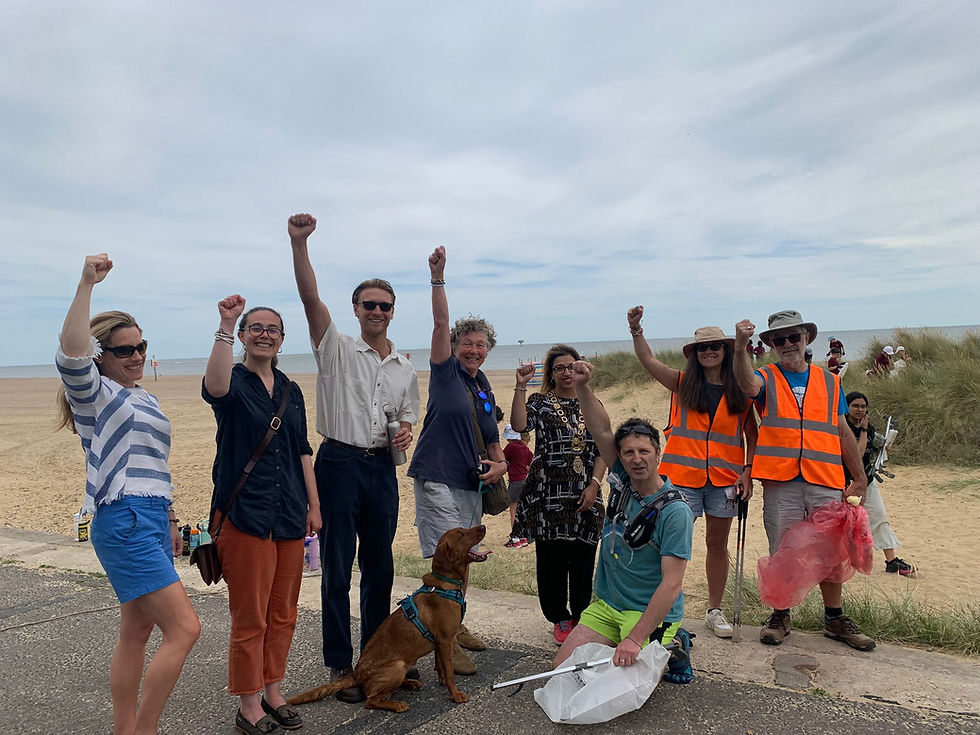Ending Plastic Pollution: From Shoreline to System Change
- Nathalia Fisher
- May 27, 2025
- 3 min read
Plastic pollution is often talked about as a visible problem — the bags, bottles, and wrappers that litter our beaches and streets. But those of us working on the frontlines of this crisis know that the real challenge runs far deeper. It is systemic.
That’s the message Luke Douglas-Home, founder of A Future without Rubbish and widely known as The Coastline Runner, shared when he was recently featured in a powerful World Environment Day 2025 article by the Society for the Environment. The piece includes a lineup of leading Chartered Environmentalists, and we’re proud to see Luke’s work among such strong voices.
A coastline runner’s reality
Every time Luke runs along the UK’s shoreline, he documents the sheer scale of plastic waste we’re up against. Lately, it’s been billions of plastic nurdles—tiny, lentil-sized pellets used in manufacturing—washed up in shocking numbers since a North Sea spill on 10 March. These microplastics don’t just pollute our seas; they infiltrate fragile ecosystems.
At Hunstanton, a once-thriving fulmar nesting site, adult birds are now feeding these plastic pellets to their chicks, mistaking them for fish eggs. With the species already in serious decline—over 50% in the last 30 years—this silent crisis is turning deadly.
Beyond beach cleanups

But A Future without Rubbish is about far more than collecting waste. As Luke says, “Our work extends well beyond beach cleanups. We work directly with councils and communities, deliver environmental education in schools, and inspire young people to become changemakers.”
By bringing environmental education into classrooms, we’re building a generation that not only cares but acts. We teach pupils that they can change their environment — and their future — through knowledge and local action.
We also support councils with practical tools. Our ISRRA framework (Initial Site Risk and Responsibility Analysis) helps identify and assess the risks of historic landfill sites — many of which still leak toxins, microplastics and pollutants into rivers and seas. These hidden sources of contamination must be tackled if we are serious about real, lasting change.
Ending Plastic Pollution Means Tackling the Root Causes
Luke puts it plainly: “Plastic pollution is not just a litter issue — it’s a systemic failure.” It’s the outcome of poor education, weak accountability, flawed design systems, and underfunded infrastructure.
If we’re to truly end plastic pollution, we need more than eco-swaps or coastal cleanups (though those are valuable). We need full transparency from producers, investment in binfrastructure and public signage, and laws that make circular, environmentally sustainable design the norm — not the exception.
That’s why our mission is threefold: educate, advocate, and act.
Because when we stop seeing the environment as “other” — when we see it as part of ourselves — we nurture it. We defend it. And we hold accountable those who harm it.
What’s next?

In Lowestoft, on 4th July, we’ll be bringing it all together: a day of action with Year 3 and the Eco Club of St Mary’s Roman Catholic Primary School, Lowestoft Town Council, UKELA (United Kingdom Environmental Law Association), and the local community.
The pupils will lead a beach clean under the banner ‘Set the Standard’, ensuring their shoreline is clean, welcoming, and respected. Talks before and after the event will come from Luke Douglas-Home, UKELA, the council, and the pupils themselves. Litter pickers, gloves, and bags will be supplied by the Marine Conservation Society and Surfers Against Sewage.
To close the day, The Coastline Runner will set off down the coast toward Southwold — passing the cliffs and nesting sand martins this work aims to protect.
We’ll be building on last year’s event, featured by the BBC watch here, aiming to make an even bigger impact.
Get involved
This is what it looks like to take action beyond the bin bag. This is what system change feels like.
If you want to be part of it – join us, follow the journey, or support our work by wearing one of our ethically made, circular T-shirts: thecoastlinerunner.teemill.com.
Our oceans can’t wait. Let’s redesign the system.



Comments